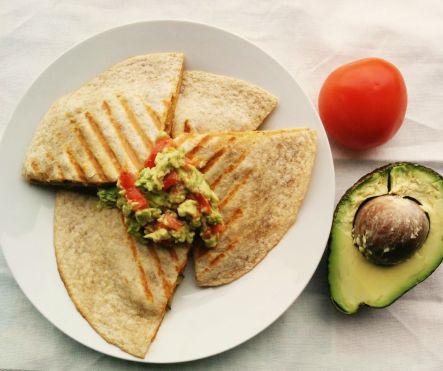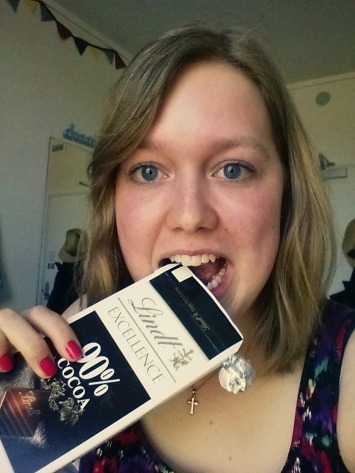Hey friends!
Is it the full-fat milk that’s causing the spare tyre around your waist? The muffin says it’s 95% fat-free…that means it’s healthy, right? There is a lot of uncertainty surrounding this major dietary component. Katie from ‘Chocolate covered Katie’ has put out a challenge for us to show fat some love this month. Today I’m hopefully going to undo some of the myths and confusion concerning fat. I’ve got some simple tips to help you get fat-savvy.
Types of fats:
First things first, fats are not all equal. The macronutrient game is not a democracy. The fact of the matter is, there are two types of fat, saturated and unsaturated. Saturated fats are more difficult to break down, and are found in your stereotypical ‘junk’ food… sorry I hate to point fingers but that unfortunately includes Dunkin’ Donuts.

Healthy dose of fat on my toast
Unsaturated fats are found in plant sources such as olive, avocado and nut oils. These are the good-guys! They are monounsaturated or polyunsaturated fats which are easier for our body to break down and have a lower disease risk associated. These fats should definitely be included in your everyday life. You’ll find them in avocado, nuts, seeds and bitter chocolate. I grant you full permission to dive into the peanut butter.

The way to a girl’s heart
Another fat which has been getting bad publicity (and rightly so) are trans-fats. Trans-fats are found in foods due to processing. Hydrogenation is where hydrogen atoms are added to polyunsaturated vegetable oils, in order to increase the melting point and make fats spreadable eg. Margarine. This processing results in trans-fats. Trans-fats increase risk of heart attacks by increasing the level of LDL (that’s the bad cholesterol) in our blood.
Calories:
So it is worth noting that foods high in fat will come with a higher calorific component. To a dieter this spells disaster, but to us cleverer folk this means that eating unsaturated fats is going to leave us feeling more satisfied and fuller for longer.
However, it is wise to exert some self-control, because too much fat will lead to weight gain.
The low-fat trap:
Eeeeek… all this talk about fat might have you running as fast as your grande skinny, sugar-free, caramel latte-fueled legs can take you…but before you do there’s something you should know. Low fat products are not necessarily healthy. What?! You’re thinking…’Megan you just told me fat is an artery-clogging, heart stopping nightmare, so surely eating low-fat is a good thing?’
Well that’s just it. When those clever food scientists make low-fat products, they often don’t taste too great (because fat is yummy right.) So what they do is add in a whopping heap of sugar to compensate. Then what you end up with is a nutritionist’s nightmare. A product which is perceived as healthy, which in actual fact will cause poor, misled consumers to actually gaining weight.

See below for the link to these
Top tips:
- Eat more vegetable fats (unsaturated) and less animal fats (saturated)
- Check low-fat products for extra sugar
- Avoid products with trans-fats or ‘partially hydrogenated oils’
- Be aware of overall fat consumption, because even good fat= high calories

Will study for chocolate
Here are some recipes which include healthy fats:
Hopefully you found this post helpful. Please comment below if you have any questions or things you would like to add.
M x
Disclaimer: I am not a healthcare professional. All opinions and recommendations given on this blog are my own, and are founded in the knowledge I have obtained in research and my Nutritional studies this year. Please seek medical advice for particular treatment, specific to you.
Rescources:



Very interesting
LikeLike
diving into a jar of peanut butter with a teaspoon would be a dream rn!
LikeLike
I couldn’t agree more. I have an embarassing number of empty pb jars in my room.
LikeLike
Right on! Not all fats are created equal and not all should be avoided. I stopped eating low-fat products after years unsuccessful dieting. Low-fat products are a big scam.
LikeLike
Couldn’t agree more! I hope more people will come to realize it too.
LikeLike
Great tips! I love talking about healthy fats 🙂
LikeLike
Thanks. Do you have a favourite kind?
LikeLike
What’s your opinion on saturated fats like coconut oil? Many people/groups – I Quit Sugar for example – are huge advocates of it with the argument of “we’re made of it, so it makes sense for us to eat it” also bone broth is supposed to contain tons of collagen from the animal fats = benefits. What I’ve found with these though is that it’s all based on personal experience? And while I haven’t read any scientific evidence (eg biochemical pathways from consumption of different fats) supporting sat fats there’s also none really against it – raised bad cholesterol and heart disease comes from an overconsumption of sat fats, which ignores the potential benefits of consumption of less ridiculous amounts. Lol sorry I find this really interesting and don’t wanna study, love your nerdy friend xoxoxo
LikeLike
Tricky question. I think you would be hard pressed to find enough evidence to support either argument concerning coconut oil. I don’t think that it is fully understood. Personally, I would prefer to edge on the cautious side and not advocate slathering coconut oil on everything. As I said…a diet that’s very high in fat is not ideal either. It makes sense to eat it (coconut oil or bone broth) in small amounts if you desire. If I am baking I may use coconut oil in a particular recipe because of it’s taste and consistency, and that’s fine. I personally prefer to use other unsaturated fats for cooking, such as rice bran oil. Eating a large amount of anything is bad for you, so it’s really up to your personal preference. Hopefully that makes sense. Now go study! haha
LikeLike
Yeah that makes sense! I agree, I don’t think there’s really enough evidence supporting either. Ahhh okay fine I’m studying I promise 😉
LikeLike